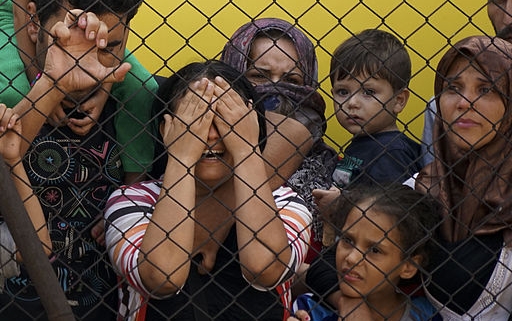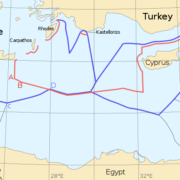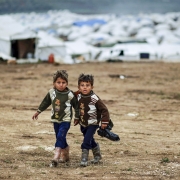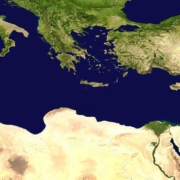Over the last five years, more than 20 million people have been displaced inside Syria or even exiled to neighbouring countries and Europe. With a Civil War taking place between those in favour and those against President Bashar-al Assad, violence and war crimes have been committed from both sides as a result of this battle. Additionally, the involvement of religious sects with the significant rise of the jihadist group of Islamic State (IS) in Syria deteriorates further the conflict.
In the fear of a refugee influx inside Europe, many EU member states have decided to impose entry restrictions to newcomers by adhering to the Regulation (EU) 604/2013 (Dublin III Regulation). This regulation shapes the Common European Asylum System which sets a single Member State as responsible for the examination of the asylum applications [Article 3,1 and 3,2 of the Regulation EU 604/2013). According to Article 18, the responsible Member State is obliged to take back the third-country national, if another Member State rejects the asylum application. Thus, the Dublin III regulation could be translated like a “burden and a punishment for the Member State which permitted the individual to arrive in the Union” (Guild 2006:637 quoted in Mouzourakis, 2014:11).
As an additional measure to stop irregular migration in Europe, the recent EU-Turkey Agreement on 18 March permits the return of migrants and asylum seekers to Turkey. The agreement recalls that each application of a third national will be subject to the EU asylum rules (Directive 2013/32/EU). The UN High Commissioner for Human Rights, Zeid Ra’ad Al Hussein, expressed his serious concerns over the agreement and suggested the implementation of practical recommendations of the UN or other international organisations/experts. Finally, he warned, “if the EU starts to circumvent international law, there could be a deeply problematic knock-on effect in other parts of the world” (OHCHR, 2016).
The United Nations position over the EU Refugee policies
With the borders now closed, tens of thousands of refugees are now stranded in Greece. The UN Refugee Agency alerted the international community by saying that international solidarity and organised global action is needed to support the Syrian people. In response to the increasing need for humanitarian assistance in Europe, the United Nations High Commissioner for Refugees (UNHCR) has prepared a winterization appeal plan for 2015/2016 due to fears for life losses during the winter months.
Refugee crisis equals to European Crisis
Some interesting conclusions can be drawn here. First of all, the Syrian refugee problem could be translated as a crisis not only in the Middle East but in Europe as well. Both cultures are facing deep cultural and political problems. In the Middle East, the instability, the anarchy and the rise of brutal fanaticism are the dominant generators of refugee flows.
On the other side, Europe seems unable to manage its refugee issues. The internal difficulties such as recession and exit scenarios for Greece/UK put the European integration into risk. Additionally, public opinion is already divided over the reception of refugees in the EU. For instance, Germany has been critical over the strict refugee policy of other EU countries while accepting the largest number of asylum-seekers. On the contrary, Hungary has adopted a stricter stance due to fears of the rising numbers of Muslims in Europe. For the same matter, Czech Republic appeared more sceptical and reserved, while Slovakia suggested stricter measures for third nationals across the borders of the Schengen Area¹. Finally, some Western European countries such as Denmark, France and the UK adopted a quota system in the number of refugees that will enter their territory.
Photo: Mstyslav Chernov, Women and children among Syrian refugees striking at the platform of Budapest Keleti railway station (2015). Source: (Wikimedia Commons) | (CC BY-SA 4.0)
Footnotes
[1] Schengen Area:
The border-free Schengen Area allows free movement of the EU citizens to internal borders without being subjected to border checks including most EU countries (except for Bulgaria, Croatia, Cyprus, Ireland, Romania, and the United Kingdom) and four non-EU States (Iceland, Norway, Switzerland and Liechtenstein).
Bibliography
BBC (2016) Why is EU struggling with migrants and asylum? , BBC News, 3rd March, Available at: http://www.bbc.co.uk/news/world-europe-24583286 (Accessed 27th March 2016)
Directive 2013/32/EU of the European Parliament and of the Council of 26 June 2013 on common procedures for granting and withdrawing international protection (recast), Official Journal of the European Union L180, 29.6.2013, p.60-95, Available at: http://eur-lex.europa.eu/legal-content/EN/TXT/PDF/?uri=CELEX:32013L0032&from=en (Accessed 28th March 2016)
European Commission (2016a) EU-Turkey Agreement: Questions and Answers, Press Release, 19th March, Available at: http://europa.eu/rapid/press-release_MEMO-16-963_en.htm (Accessed 28th March 2016)
European Commission (2016b) Schengen Area, Migration and Home Affairs, Available at: http://ec.europa.eu/dgs/home-affairs/what-we-do/policies/borders-and-visas/schengen/index_en.htm (Accessed 27th March 2016)
Frej W. (2015) Here Are the European Countries that Want to Refuse Refugees, The Huffington Post, 9th September, Available at: http://www.huffingtonpost.com/entry/europe-refugees-not-welcome_us_55ef3dabe4b093be51bc8824 (Accessed 27th March 2016)
Mead R.W. (2015) The Roots of the Migration Crisis, The Wall Street Journal, 11th September, Available at: http://www.wsj.com/articles/the-roots-of-the-migration-crisis-1441995372 (Accessed 27th March 2016)
Mouzourakis M. (2014) ‘We Need to Talk about Dublin’, Refugee Studies Centre Working Paper Series, 105, Available at: http://www.rsc.ox.ac.uk/files/publications/working-paper-series/wp105-we-need-to-talk-about-dublin.pdf/ (Accessed 27th March 2016)
OHCHR (2016) UN rights chief expresses serious concerns over EU-Turkey agreement, Media Centre, Geneva, 24th March, Available at: http://www.ohchr.org/EN/NewsEvents/Pages/media.aspx?IsMediaPage=true (Accessed 27th March 2016)
Regulation (EU) No 604/2013 of the European Parliament and of the Council of 26 June 2013, Official Journal of the European Union L180, 29.06.2013, p.31-59, Available at: http://eur-lex.europa.eu/LexUriServ/LexUriServ.do?uri=OJ:L:2013:180:0031:0059:EN:PDF(Accessed 27th March 2016)
Rodgers L., Gritten D., Offer J. and Asare P. (2016) Syria: The story of the conflict, BBC News, 11th March, Available at: http://www.bbc.co.uk/news/world-middle-east-26116868 (Accessed 27th March 2016)
UNHCR (2016a) Syria conflict at five years, News Stories, Geneva, 15th March, Available at: http://www.unhcr.org.uk/news-and-views/news-list/news-detail/article/syria-conflict-at-five-years.html (Accessed 26th March 2016)
UNHCR (2016b) UNHCR Special Envoy Angelina Jolie Pitt visits Greece, Press Releases, 16th March, Available at: http://www.unhcr.org/56e94bd96.html#_ga=1.78198612.1919156883.1458842404 (Accessed 25th March 2016)
UNHCR (2015c) Winterization Plan for the Refugee Crisis in Europe, November 2015-February 2016, Geneva, 5th November, Available at: http://www.unhcr.org/563b26049.html (Accessed 27th March 2016)






 176th Wing Alaska Air National Guard's photostream
176th Wing Alaska Air National Guard's photostream 



Leave a Reply
Want to join the discussion?Feel free to contribute!